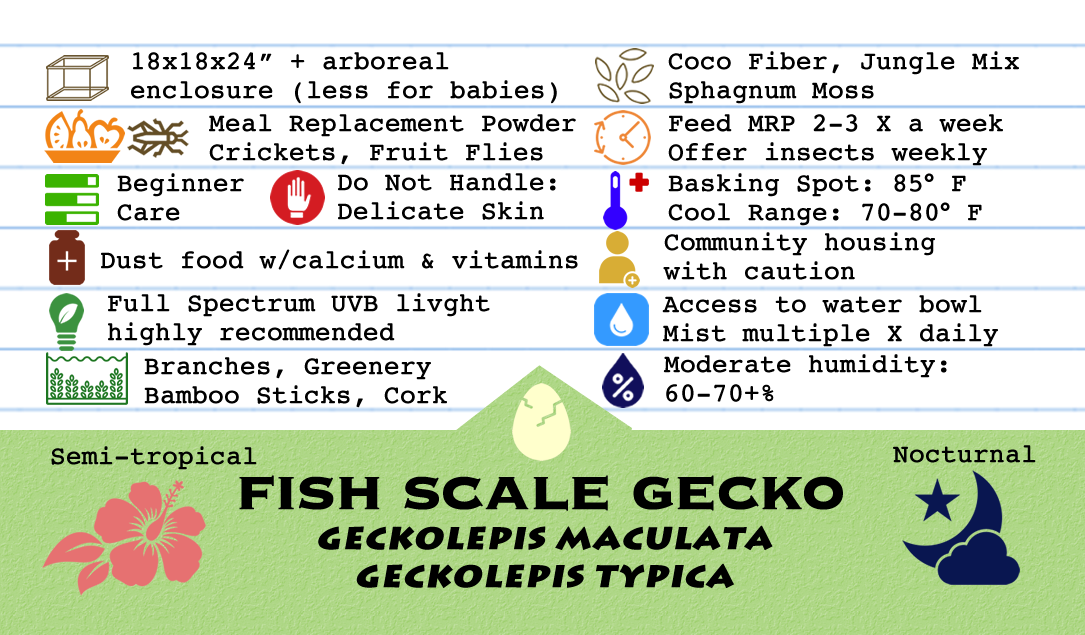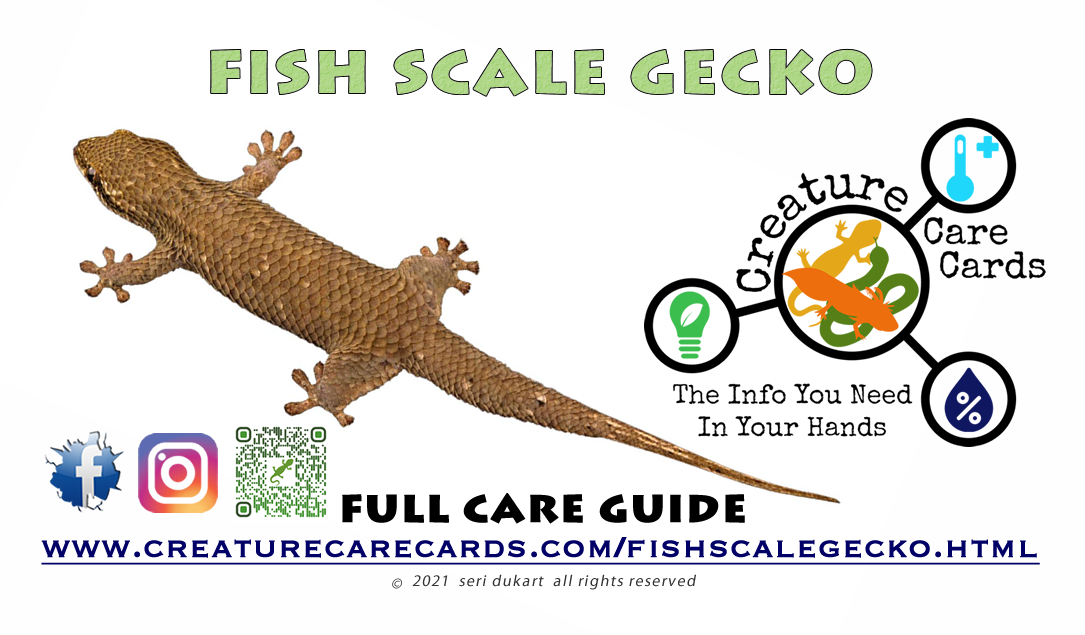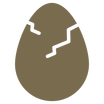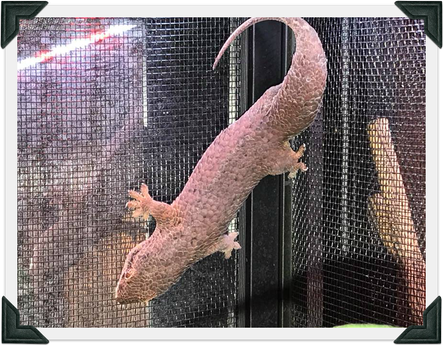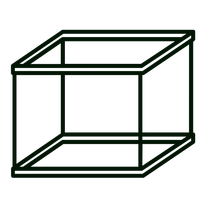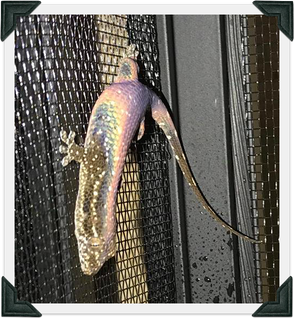Geckolepis maculata and typica - Fish Scale Geckos
Fish Scale Geckos (G. maculata and G. typica as well as other species) are a small to medium, stubby-bodied fast moving gecko with a rainbow sheen to their fish-like scales. They are a endemic to Madagascar and the Comoro Islands and are a sub-tropical, arboreal and nocturnal gecko. They are very similar in looks and care, other than their size. G. maculata and others are significantly larger than their nearly identical but much smaller cousins, G. typica. There are also 3 other less commonly seen species, G. humloti, G. polylepis and G. megalepis.
All of the fish scale species have the ability to "crawl" out of their skin when touched, shedding their individual scales to slip away from predators. These scales grow back rather fast, but their underlaying skin is left exposed in the meantime. For this reason, any of the fish scale species should be handled with extreme care.
- Peters's spotted gecko or fish-scale gecko, Geckolepis maculata
- Comoran fish scale gecko, Geckolepis humbloti
- Many-scaled gecko, Geckolepis polylepis
- Grandidier's gecko, Geckolepis typica
- Geckolepis megalepis
All of the fish scale species have the ability to "crawl" out of their skin when touched, shedding their individual scales to slip away from predators. These scales grow back rather fast, but their underlaying skin is left exposed in the meantime. For this reason, any of the fish scale species should be handled with extreme care.
|
Bringing Your New Pet Home
When you bring your new gecko home, you should already have a quarantine tank set up and ready to go. Place fresh water in a bowl in the tank, mist the tank and offer food, but be aware it is completely normal for them to refuse food for the first couple days, or even longer. You should keep this new gecko separate from any other geckos you may have for 90 days, to ensure there is nothing it could spread to your other animals. Monitor its eating and fecals as they may be strange for up to a couple weeks, but this is due to a new diet, supplements, and environment. It is recommended you do not handle your new gecko for the first 24-48 hours and keeping it to a minimum until it has started eating on its own. Always keep in mind, your new animal is in a new tank, with new decor/dishes/hides, and new faces watching them. They need time to become acclimated to it all. After this quarantine process, they can be safely introduced to their permanent enclosure if it's not already. Be sure to wash your hands before handling any other geckos during this time. |
|
Substrate
Fish scale geckos thrive best on simple substrates such as paper towel, sphagnum moss, or eco-earth. Loose substrates should be used with caution; geckos can ingest it while hunting bugs and become impacted. If you use loose substrates, it is best to feed out of enclosure or by tongs, or you can monitor your geckos while they eat. |
|
Compatibility
Fish scale geckos can be housed in a community setting with caution. However, to successfully do so, the amount of space needs to be significantly larger than housing a single gecko or a pair. They must be of the same size to prevent bullying. Adding more hides and decor will help prevent fighting. Males may fight with one another, and geckos of different sizes will bully and attack one another. Do not house males and females together unless you have researched breeding and are prepared for eggs and babies. Monitor all geckos to be sure they are not picking on one another or one is not hoarding the food from the other. Typica, the smaller species, tend to work in a community better than maculata and other larger fish scales. |
|
Temperatures
Geckolepis come from Madagascar and are sub-tropical. They thrive with a range of temperatures. A low wattage basking spot is appreciated, with a temperature of about 85 degrees F. Despite being mostly active at night, they are often found hanging out under a basking spot during the day. A gradient of low 70s to mid-80's is ideal for the rest of the enclosure. |
|
Lighting
Fish scale geckos are nocturnal, meaning they are active at night. They should be exposed to 10-12 hours of light per day. The addition of tropical UVB or UVA light is highly recommended. All lights should be placed on a timer so the gecko has darkness at night, when they are most active.
|
|
Cage Decor
Since they are nocturnal and arboreal, they need to have places to hide from the daylight to sleep and climb. You will most often find fish scale geckos hanging out in branches or foliage, so decorate the tank heavily with fake greenery, branches, with the addition of cork bark and cork rounds. |
|
Humidity and Shedding
Fish scale geckos are a sub-tropical species, so they require moderate humidity level of around 60-70% with dry periods. You can best achieve this by misting the enclosure twice a day, once in the morning and once at night. While it is good to offer a shallow bowl of fresh water, most geckos will not drink from bowls and instead prefer to lick water droplets off the enclosure walls and plants. Misting will not only keep the humidity levels up, but offer them hydration as well. You do not want the cage soaking wet, and should allow it to dry out some between mistings. Fish scale geckos will shed their skin as they grow and regularly as adults. You’ll notice their color will appear dull when they are about to shed. Generally, the gecko will eat all of their shed, but you may see some of the shed skin in the cage. Some geckos will have unshed skin on their toes, we suggest letting your gecko soak in a shallow container of lukewarm water for a few minutes and you can assist the process by gently removing the skin using tweezers. Stuck shed is often an indication of humidity issues, so you can help this by misting more often or heavier.
|
|
Water
Your fish scale gecko should have access to fresh, clean water in a shallow bowl at all times. Some will not drink directly from bowls and prefer to lick water from misting off leaves, but many have been seen drinking from bowls. Water can be treated with a commercial water treatment to remove any harsh chemicals from the water. |
|
Feeding Fish scale geckos are insectivores and frugivores. Typically, their diet consists of small insects like fruit flies, crickets or dubia roaches and a commercial based, balanced fruit powder you prepare much like a smoothie. These diets are called meal replacement powders or MRPs. Do not feed mealworms or superworms, as they do not digest them well. Crickets can be placed in the enclosure during feeding time, but uneaten crickets should always be removed. MRPs can be mixed in small bowls and placed in enclosure. Insects should be gutloaded with a commercial gutload product. Gutloading refers to the practice of feeding the insects a nutritious diet before offering them to your gecko, to ensure the most balanced nutrition. Geckos that are under 4-6 months old should have MRPs available at all times and it should be changed out every other day with fresh food. Adults can go a few days between feedings and should be offered fresh food 2-3 times per week. Keep on eye on food to be sure it is not molding, and remove or replace if it is. Crickets or roaches (or fruit flies for babies and G. typica) can be offered weekly or twice weekly if yours are enthusiastic insect eaters. Some fish scales prefer their meal replacement powder. For this reason, I offer Pangea Fig with insects for my own, for added protein. Be sure the insect is appropriately sized for your gecko. It should be no larger than the space between their eyes. Uneaten insects should be removed after a few hours. 
There are many MRPs on the market in a variety of flavors.
Some of the most commonly found are Pangea Complete Gecko Diet and Repashy Gecko Diet. |
|
Handling
Fish scale geckos can be handled if they are tame and used to your presence, however, because of their ability to slough their scales with even the lightest touch, it is best to not handle them unless they will willingly walk from hand to hand. This is a gecko best viewed in enclosure to minimize potential skin and scale damage. Their rainbow sheen is beautiful under the right light, and they are inquisitive and brave and fun to watch. |
|
Lifespan & Size
Fish scale geckos are very uncommon in the captive hobby, so not a lot is known about them other than from a few keepers. Their estimated lifespan is around 10 years. G. maculata and the other similar species reach about 7" from nose to tail. G. typica are much smaller, usually around 3-4" as adults. |
